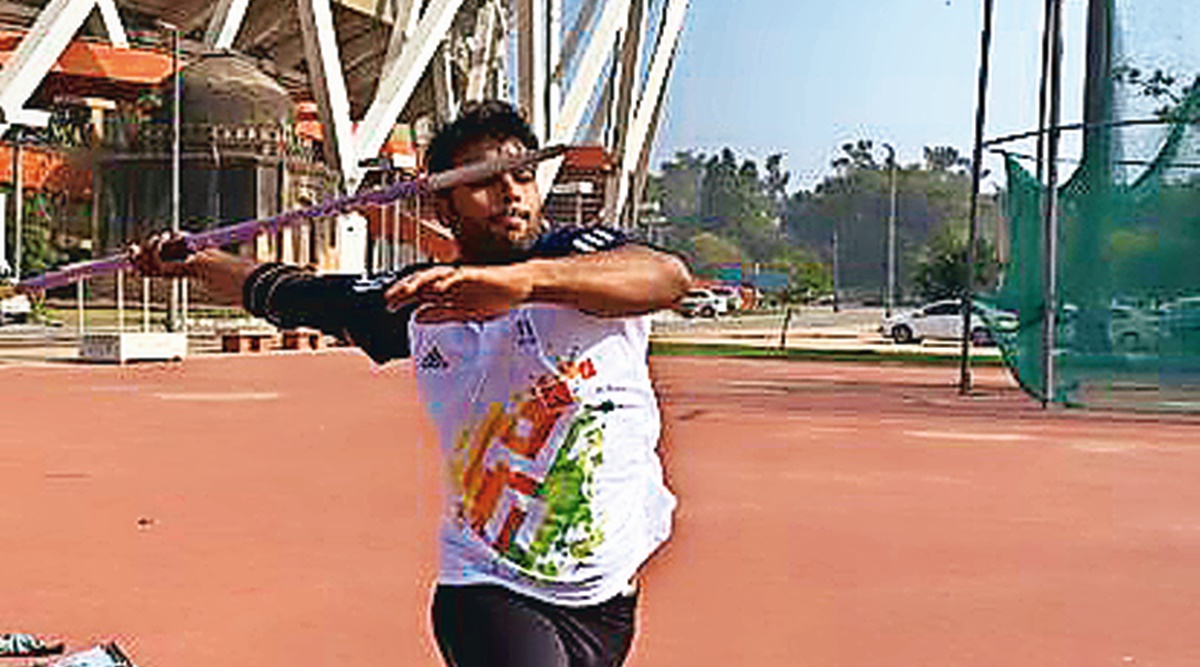 Sumit Antil finished seventh at the Indian Grand Prix.
Sumit Antil finished seventh at the Indian Grand Prix. At 66.43 m, javelin-thrower Sumit Antil finished seventh at the Indian Grand Prix in Patiala last week. Though the event was won by Tokyo Olympics-bound star Neeraj Chopra, who broke the national record with 88.07 metres, the day’s loudest cheer went up for the 22-year-old Antil.
Six years ago, this boy from village Khewra near Haryana’s Sonepat was returning home from a tuition class. A tractor hit his bike, his left leg had to be amputated. After months in hospital, a prosthetic leg revived his sporting dreams, gave him the confidence to compete with national stars and, at the Indian GP, break the world record for para athletes.
In Patiala last Saturday, Antil, a 2019 World Para Championship silver medallist, broke compatriot Sandeep Chaudhary’s world record in the javelin’s F44 and F64 categories — para track-and-field events have classifications based on the physical disabilities of athletes.
Chopra, along with another elite thrower Shivpal Singh, and with national coach German Uwe Hohn, the first man in history to break javelin’s 100-m barrier, would walk across to congratulate Antil and “give their blessings”. Hohn would even call Antil’s coach Naval Singh to talk about the new world record holder’s potential.
“Because of the pandemic, I was competing in my first meet since the 2019 Worlds. After our para national body gave me the permission to compete in the Indian Grand Prix, I was very excited. I was only thinking about my performance. I was motivated to see Neeraj Bhai and Shivpal Bhai throw over 80 m that evening. And to have a coach like Uwe applaud my effort was my biggest reward,” Antil told The Sunday Express.
At an early age, Antil took to wrestling. The death of his father, who served in the Indian Air Force, because of cancer didn’t deter him. The youngest of four children, he was a regular at local dangals. Antil would soon graduate to the Sports Authority of India (SAI) centre at Bahalgarh. Things were going as he had planned — until that day in January 2015.
“Kushti aur padhai mein kuch karke naukri lagne ka sapna tha. (I had plans to get a job through wrestling and also focusing on studies). But the accident changed things. When it happened, I was conscious and made the call to the ambulance. Later, doctors told me about the need to amputate my leg,” he recalls.
The 53-day stay at the hospital was trying. That’s when he stumbled across the video of the world’s most famous para athlete, South African Oscar Pistorius aka Blade Runner. A double-leg amputee, Pistorius competed at both Paralympics Games and Olympic Games in 2012.
“I would search videos about para athletes on my phone and saw videos of Oscar Pistorius. After I was discharged from the hospital, I went to Pune for the prosthetic leg certain that I would join sports again,” says Antil.
His coach Naval Singh says Antil, who qualified for the Para Olympics later this year, touched the 45-m mark within four months of training.
“He has a natural ability but we faced a different challenge. After 10-15 days of training, the skin on his knee, which marked the connection to the prosthetic leg, would get severely bruised and we had to stop training. So we would work on increasing his lower body strength. Once healed, he would spend more than eight hours training every day,” says Singh.
Last week, Antil also broke his imported prosthetic leg in his attempt to set the new world record and this is what worries the coach most in the run-up to Tokyo. “We were planning to get him a new leg in March 2020. But then the lockdown meant that these plans got postponed. At Patiala, he broke his prosthetic leg and we have been training with a different leg since the last five days. It is like starting all over again. If things remain well, he can touch the 70-m mark this year,” says Singh.
As for Antil, there’s another powerful reason to win a medal at Tokyo, his mother Nirmala. “She has been my pillar of strength all these years and for her to see me win an Olympic medal will be the gift for all her struggles,” he says.